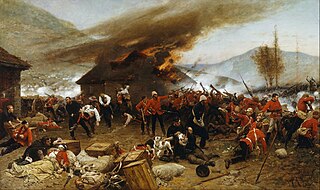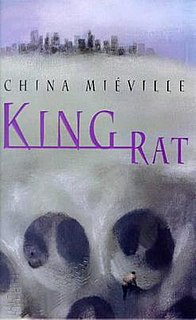
Shaka kaSenzangakhona, also known as Shaka Zulu and Sigidi kaSenzangakhona, was the founder of the Zulu Kingdom from 1816 to 1828. He was one of the most influential monarchs of the Zulu, responsible for re-organizing the military into a formidable force via a series of wide-reaching and influential reforms.
Zulu people are a Nguni ethnic group in Southern Africa. The Zulu people are the largest ethnic group and nation in South Africa with an estimated 10–12 million people living mainly in the province of KwaZulu-Natal.

The Battle of Rorke's Drift (1879), also known as the Defence of Rorke's Drift, was an engagement in the Anglo-Zulu War. The successful British defence of the mission station of Rorke's Drift, under the command of Lieutenants John Chard of the Royal Engineers and Gonville Bromhead, began when a large contingent of Zulu warriors broke off from their main force during the final hour of the British defeat at the day-long Battle of Isandlwana on 22 January 1879, diverting 6 miles (9.7 km) to attack Rorke's Drift later that day and continuing into the following day.

The Anglo-Zulu War was fought in 1879 between the British Empire and the Zulu Kingdom. Following the British North America Act of 1867 for the federation in Canada, by Lord Carnarvon, it was thought that similar political effort, coupled with military campaigns, might succeed with the African Kingdoms, tribal areas and Boer republics in South Africa. In 1874, Sir Bartle Frere was sent to South Africa as High Commissioner for the British Empire to effect such plans. Among the obstacles were the armed independent states of the South African Republic and the Kingdom of Zululand.

Cetshwayo kaMpande was the king of the Zulu Kingdom from 1873 to 1879 and its leader during the Anglo-Zulu War of 1879. His name has been transliterated as Cetawayo, Cetewayo, Cetywajo and Ketchwayo. Cetshwayo consistently opposed the war and sought fruitlessly to make peace with the British, and was defeated and exiled following the Zulu defeat in the war. He was later allowed to return to Zululand, where he died in 1884.

The Battle of Isandlwana on 22 January 1879 was the first major encounter in the Anglo-Zulu War between the British Empire and the Zulu Kingdom. Eleven days after the British commenced their invasion of Zululand in Southern Africa, a Zulu force of some 20,000 warriors attacked a portion of the British main column consisting of about 1,800 British, colonial and native troops and perhaps 400 civilians. The Zulus were equipped mainly with the traditional assegai iron spears and cow-hide shields, but also had a number of muskets and antiquated rifles.

Zulu is a 1964 British epic war film depicting the Battle of Rorke's Drift between the British Army and the Zulus in January 1879, during the Anglo-Zulu War. It shows how 150 British soldiers, 30 of whom were sick and wounded patients in a field hospital, successfully held off a force of 4,000 Zulu warriors. The film is notable for showing the Zulu army as disciplined and governed by strategy.

The Natalia Republic was a short-lived Boer republic founded in 1839 after a Voortrekker victory against the Zulus at the Battle of Blood River. The area was previously named Natália by Portuguese sailors, due to its discovery on Christmas. The republic came to an end in 1843 when British forces annexed it to form the Colony of Natal. After the British annexation of the Natalia Republic, most local Voortrekkers trekked north into Transorangia, later known as the Orange Free State, and the South African Republic.

King Rat is an urban fantasy novel by British writer China Miéville, published in 1998. Unlike his Bas-Lag novels, it is set in London during the late 1990s. It follows the life of Saul Garamond after the death of his father and his meeting with King Rat. As King Rat takes Saul under his wing, the young man is quickly embroiled in a centuries-old rivalry. King Rat was Miéville's debut novel.

Alfred Henry "Harry" Hook VC was an English recipient of the Victoria Cross, the highest and most prestigious award for valour in the face of the enemy that can be awarded to British and Commonwealth forces, for his actions at the Battle of Rorke's Drift.

Nevill Josiah Aylmer Coghill VC was an Irish recipient of the Victoria Cross, the highest and most prestigious award for gallantry in the face of the enemy that can be awarded to British and Commonwealth forces.

The Siege of Eshowe took place during the Anglo-Zulu War of 1879. The siege was part of a three-pronged attack on the Zulu Impis of king Cetshwayo at Ulundi. After an incursion as far as Eshowe Colonel Charles Pearson was besieged there for two months by the Zulus.

The Battle of Ulundi took place at the Zulu capital of Ulundi (Zulu:oNdini) on 4 July 1879 and was the last major battle of the Anglo-Zulu War. The British army broke the military power of the Zulu nation by defeating the main Zulu army and immediately afterwards capturing and burning the royal kraal of oNdini.
StarFist is a series of military science fiction novels written by David Sherman and Dan Cragg. The novels are set in the 25th century and are written from the viewpoint of the men of the Confederation of Human Worlds Marine Corps 34th FIST. As of June 2010, the StarFist series comprises 14 novels with the most recent addition of the novel, Double Jeopardy. An additional spin-off series, titled StarFist: Force Recon, by the same authors was started in 2005 with the publication of Backshot.
Lieutenant-Colonel Henry Burmester Pulleine was an administrator and commander in the British Army in the Cape Frontier and Anglo-Zulu Wars. He is most notable as a commander of British forces at the disastrous Battle of Isandlwana in January 1879. Substantively a major, he held the rank of brevet lieutenant colonel.

The Kilmichael Ambush was an ambush near the village of Kilmichael in County Cork on 28 November 1920 carried out by the Irish Republican Army (IRA) during the Irish War of Independence. Thirty-six local IRA volunteers commanded by Tom Barry killed sixteen members of the Royal Irish Constabulary's Auxiliary Division. The Kilmichael ambush was politically as well as militarily significant. It occurred one week after Bloody Sunday and marked an escalation in the IRA's campaign.

The Zulu Kingdom, sometimes referred to as the Zulu Empire or the Kingdom of Zululand, was a monarchy in Southern Africa that extended along the coast of the Indian Ocean from the Tugela River in the south to Pongola River in the north.
Professor Julian Saul David is a British academic military historian and broadcaster. He is best known for his work on the Indian Rebellion of 1857 and the Anglo-Zulu War, as well as for presenting and appearing in documentaries on British television covering imperial and military themes.

A drummer was responsible for the army drums for use on the battlefield. Drums were part of the field music for hundreds of years, being introduced by the Ottomans to Europe. Chinese armies however had used drums even before that. With the professionalization of armies, military music was developed as well. Drums were not only used for the men to march in step, but were an important part of the battlefield communications system, with various drum rudiments used to signal different commands from officers to troops. By the second half of the 18th century, most Western armies had a standardized set of marches and signals to be played, often accompanied by fifers.
Terry Brighton is a British military historian and author.















